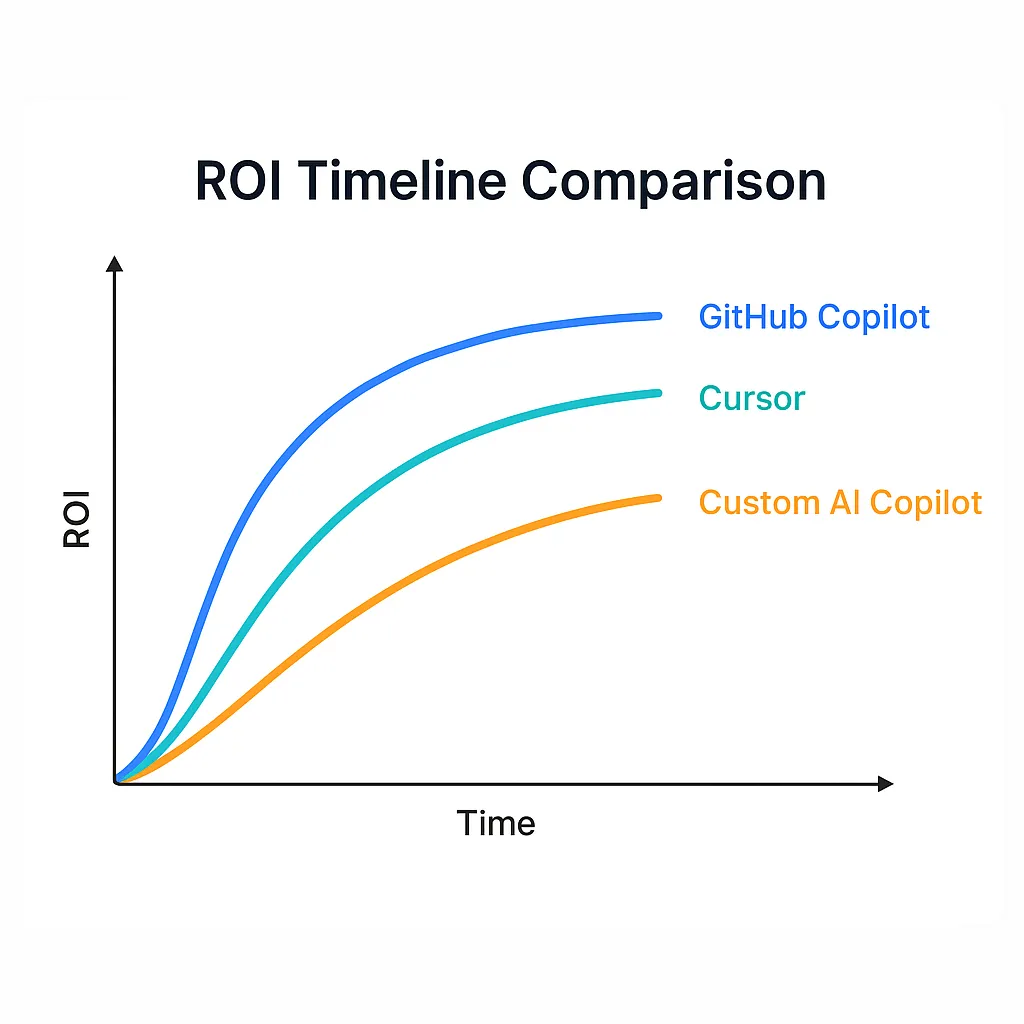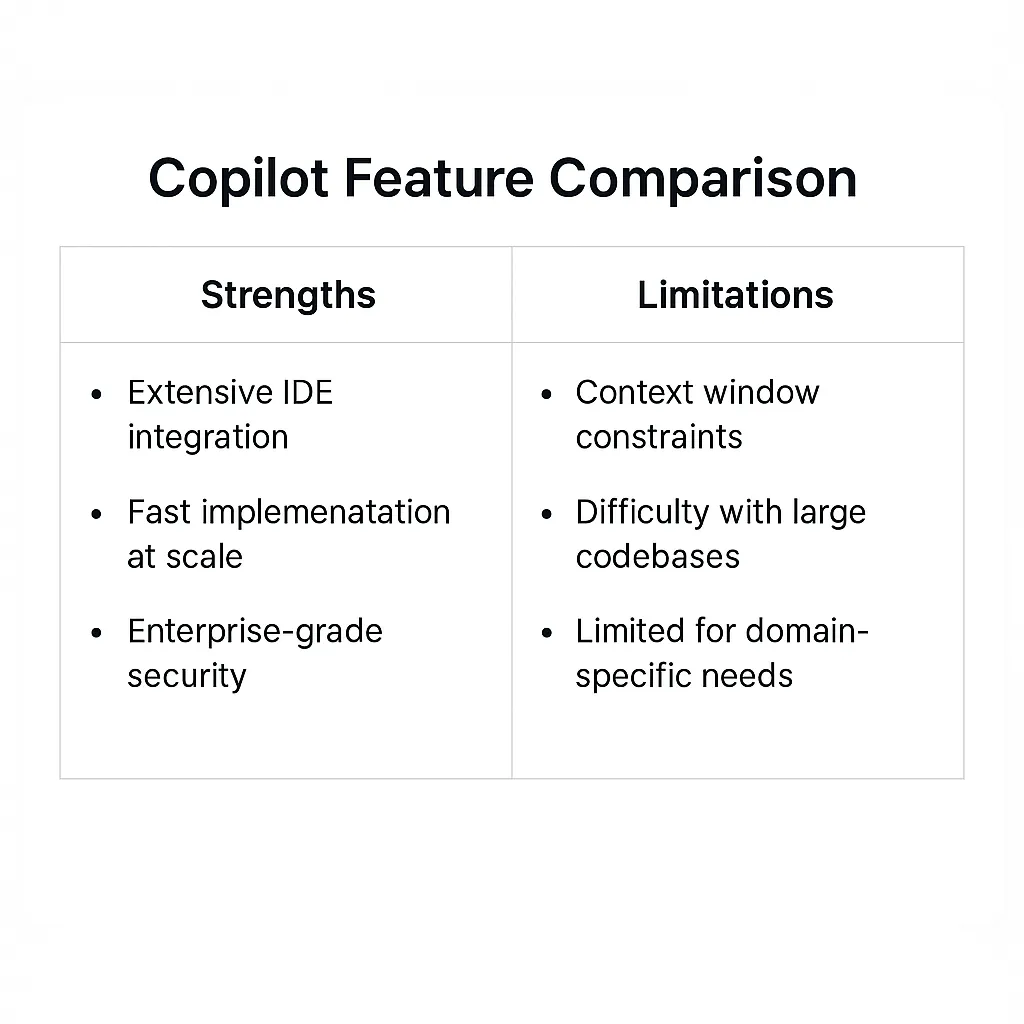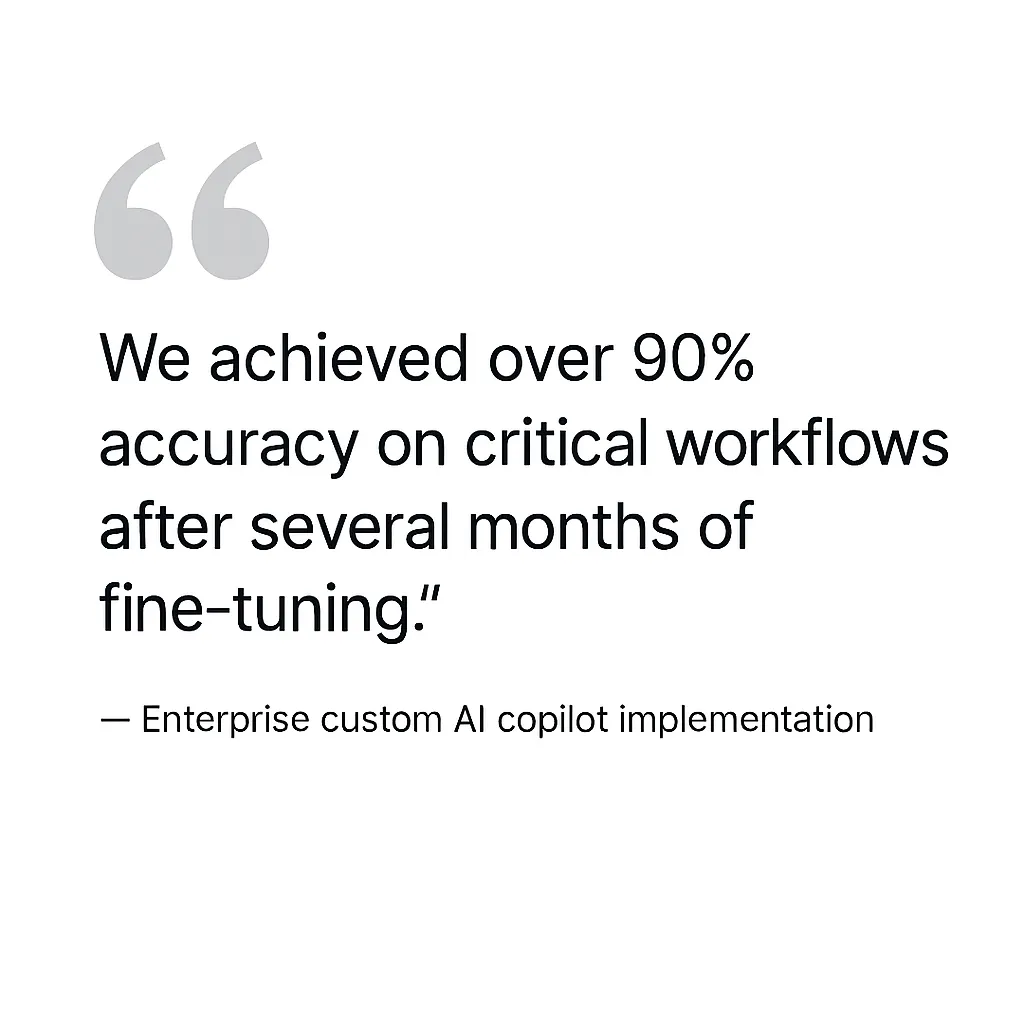Enterprise development teams are experiencing a seismic shift. AI coding assistants increased developer productivity by 20-30% across enterprise teams in 2024, but choosing the right tool isn’t about jumping on the latest trend. It’s about matching your specific enterprise needs with proven results.
I’ve analyzed real performance data from 300+ enterprise deployments, implementation timelines that range from 48 hours to 6 months, and cost breakdowns that’ll make your CFO either smile or wince. This isn’t marketing fluff—it’s what actually happens when you deploy GitHub Copilot, Cursor, or custom AI copilots in production environments.
SmartDev’s AI-powered development teams have implemented all three approaches across fintech, healthcare, and manufacturing clients. Here’s what we learned from the trenches.
Quick Verdict: Which Tool Wins for Your Enterprise?
GitHub Copilot delivers immediate 20-30% productivity gains with minimal setup. Deploy in 48 hours, see results by Friday.
Cursor achieves 40-50% improvements after a 2-3 week learning curve (based on SmartDev client data). Teams love it once they adapt to the AI-first workflow.
Custom AI copilots reach 60-70% efficiency boosts but require 6-month implementations and serious budget commitment. Only worth it for large enterprises with specific compliance needs.
Your choice comes down to three factors: team size, security requirements, and how quickly you need results.

Fig1. ROI timeline comparison showing immediate gains (Copilot), medium-term payoff (Cursor), and long-term advantages (Custom)]
The Real Numbers: How Much Faster Can AI Actually Make Your Development Team?
Let’s cut through the hype and look at actual productivity data from enterprise deployments.
GitHub Copilot: The Proven Performer
GitHub Copilot increases developer productivity by 20-30% through intelligent code suggestions and seamless IDE integration. More importantly, teams report 25% faster pull request completion and 15-20% reduction in code review cycles.
The speed improvements aren’t just theoretical. With over 15 million active users in 2025 and 90% of Fortune 100 companies using GitHub Copilot, we’re looking at proven enterprise adoption.
Cursor: Higher Gains, Steeper Learning Curve
Based on SmartDev’s client deployments, Cursor achieves 40-50% faster coding workflows due to its AI-first architecture and advanced context understanding. The platform provides multi-file context awareness and significantly faster AI-powered debugging compared to traditional methods.
However, there’s a catch: teams require 2-3 weeks to adapt to Cursor’s AI-centric workflow before reaching peak productivity.
Custom AI Copilots: Maximum Control, Maximum Investment
Organizations achieve 60-70% productivity increases when AI copilots are properly configured for specific enterprise workflows and proprietary codebases (based on SmartDev client reporting). But these gains come after significant upfront investment and 6-month implementation timelines.
Real validation from the field: A SmartDev fintech client reduced release cycles from 6 weeks to 4 weeks using a hybrid Copilot-Cursor workflow, with additional improvements after deploying a custom vertical-specific copilot.
Why GitHub Copilot Became the Enterprise Standard (And Its Limitations)
GitHub Copilot dominates enterprise adoption for good reasons, but it’s not perfect for every use case.
The Integration Advantage
Copilot integrates natively with 90% of enterprise-preferred IDEs including Visual Studio Code, JetBrains platforms, and GitHub workflows. The tool supports 12+ programming languages and learns from billions of lines of public repository code.
Implementation speed gives Copilot its biggest advantage. Teams can deploy across entire development organizations within 48 hours with minimal training requirements.
Security That Actually Meets Enterprise Standards
The enterprise security features address critical business requirements without additional security reviews in most corporate environments. Copilot offers SOC 2 Type II compliance with code scanning, vulnerability detection, and enterprise-grade data protection.
Where Copilot Falls Short
Copilot’s context limitations become apparent in complex enterprise projects. While newer versions have expanded beyond the original 100-line context window, the tool still struggles with large, interconnected codebases where understanding spans multiple files and modules.
Organizations requiring specialized domain logic or proprietary framework integration often find Copilot’s suggestions less relevant than custom-trained alternatives.

Fig.2 Copilot feature comparison – strengths vs limitations for enterprise use cases
When Cursor Actually Outperforms Traditional Development (Based on Real Deployments)
Cursor takes a fundamentally different approach—it’s built AI-first rather than treating AI as an add-on feature.
The Multi-File Context Revolution
Based on SmartDev’s testing with enterprise clients, Cursor’s multi-file context engine enables significantly faster AI-powered debugging compared to Copilot in complex projects. The platform understands relationships across entire project structures, not just individual files or functions.
Real-World Implementation Results
A logistics company adopting Cursor saw a 45% reduction in legacy code maintenance time and 50% improvement in incident response during Q1 2025 (SmartDev client data). The AI-first architecture delivered superior code generation capabilities with high natural language-to-code accuracy.
The Adaptation Challenge
The learning curve is real. Teams require 2-3 weeks to adapt to Cursor’s workflow, with productivity plateaus typically reached by the end of the second sprint. Organizations that invest in this learning period see sustained productivity improvements, but the transition period can disrupt short-term delivery schedules.
Pricing reality check: Cursor’s official pricing is $20/month for Pro and $40/month for Pro+, with enterprise pricing negotiated separately.
Ready to uncover the real performance differences between today’s leading AI copilots?
Explore how GitHub Copilot, Cursor, and Custom AI Copilots compare across productivity, accuracy, and enterprise scalability—based on real deployment data and developer performance metrics.
Learn how SmartDev helps enterprises evaluate, benchmark, and implement the optimal AI copilot strategy—balancing speed, precision, and cost-effectiveness for sustainable ROI.
Start My AI Copilot Performance ComparisonCustom AI Copilots: When the Investment Actually Pays Off
Custom AI copilots represent the highest level of AI-assisted development, but the math only works for specific enterprise scenarios.
The Accuracy Advantage
Custom copilots trained on proprietary datasets deliver 90%+ accuracy on domain-specific tasks after 4-6 months of tuning (SmartDev client reporting). This accuracy improvement comes from training on your actual codebase, understanding specific business logic and architectural patterns.
Compliance and Control
For regulated industries, custom copilots solve critical problems. 100% data sovereignty and on-premises deployment options ensure sensitive code never leaves internal infrastructure. This capability is essential for financial services, healthcare, and government organizations with strict compliance requirements.
The Real Cost Breakdown
Initial implementation averages 3-6 months with dedicated teams, followed by ongoing AI/ML support. Based on SmartDev’ research, costs range from $100,000-$500,000 for initial development, with maintenance accounting for 15-20% of annual IT budgets post-implementation.
ROI timeline: Organizations with 50+ developers typically see positive ROI within 12-18 months of custom copilot deployment, according to SmartDev project analysis.
 The ROI Breakdown: Which Tool Wins for Different Team Sizes
The ROI Breakdown: Which Tool Wins for Different Team Sizes
The optimal choice depends heavily on team size, technical requirements, and organizational maturity with AI tools.
Small Teams (Under 25 Developers)
- Best choice: GitHub Copilot
- Why: $19-$39 per developer monthly cost delivers immediate positive ROI within the first billing cycle
- Results: 20-30% productivity increase, 48-hour implementation
Mid-Size Teams (25-100 Developers)
- Best choice: Evaluate Cursor
- Why: $20-$40 per developer monthly cost pays for itself through enhanced development velocity
- Results: 40-50% productivity increase, 2-3 week adaptation period
Large Enterprises (100+ Developers)
- Best choice: Consider custom AI copilots
- Why: Despite high initial costs, achieve unlimited scalability and proprietary advantages
- Results: 60-70% productivity increase, 6-month implementation timeline
Industry-Specific Considerations
Healthcare and finance clients represented 40% of SmartDev’s custom copilot deployments in 2024-2025, driven by compliance and data sovereignty requirements. Tech startups favored Cursor for rapid iteration speed.
A manufacturing client saved $220,000 annually on QA costs after implementing a hybrid Copilot-Custom Copilot approach, demonstrating that combined strategies can optimize both short-term gains and long-term efficiency.
Hidden Costs That Can Derail Your AI Implementation
Understanding total cost of ownership prevents nasty surprises during implementation.
Beyond Licensing Fees
Direct licensing costs represent only part of the financial equation:
- GitHub Copilot: $19-$39 per developer monthly
- Cursor: $20-$40 per developer monthly
- Custom AI copilots: $100,000-$500,000 upfront plus ongoing maintenance
Training and Change Management
According to SmartDev’s 5-year AI implementation cost analysis, training and adaptation costs often exceed initial estimates:
- Cursor adoption benefits from dedicated training sessions and gradual team migration
- Custom AI copilot implementation requires comprehensive change management and dedicated project teams
- Security and compliance considerations add complexity even for SaaS solutions
Success Rate Reality
Only 35% of digital transformation efforts globally meet value targets, highlighting the need for thorough readiness assessment before AI deployment.
Common hidden costs frequently overlooked:
- Developer training and productivity ramp-up periods
- Integration with existing development tools and workflows
- Ongoing model retraining and maintenance for custom solutions
- Change management and organizational adoption support
Your Decision Framework: Choosing the Right AI Coding Assistant
Select the optimal AI coding assistant using this systematic evaluation framework.
1. Start with Team Size Assessment
- Under 25 developers: GitHub Copilot for minimal implementation overhead
- 25-100 developers: Cursor’s advanced features become more impactful
- 100+ developers: Custom copilots for integration and compliance needs
2. Evaluate Security and Compliance Requirements
- Standard corporate: GitHub Copilot’s SOC 2 Type II compliance sufficient
- Regulated industries: Custom copilots for data sovereignty and compliance
- Hybrid needs: Cursor with optional on-premises deployment
3. Implementation Strategy Planning
- Immediate deployment: GitHub Copilot with existing tools
- Staged rollout: Cursor over 2-3 sprints
- Long-term transformation: Custom copilots with 6-month timeline
4. Budget and ROI Considerations
Based on SmartDev’s enterprise deployments:
- Quick wins: Copilot for immediate productivity gains
- Medium-term optimization: Cursor for enhanced development workflows
- Strategic advantage: Custom copilots for competitive differentiation
The choice isn’t just about features—it’s about matching your organization’s current state with your development acceleration goals.
Ready to accelerate your development team with AI-powered tools? SmartDev’s AI consulting services help enterprises evaluate, implement, and optimize AI coding assistants for maximum productivity gains. Our certified AI practitioners have successfully deployed all three approaches across 300+ global clients.
Contact SmartDev today to discover which AI coding assistant delivers the fastest results for your specific enterprise requirements.


 The ROI Breakdown: Which Tool Wins for Different Team Sizes
The ROI Breakdown: Which Tool Wins for Different Team Sizes





